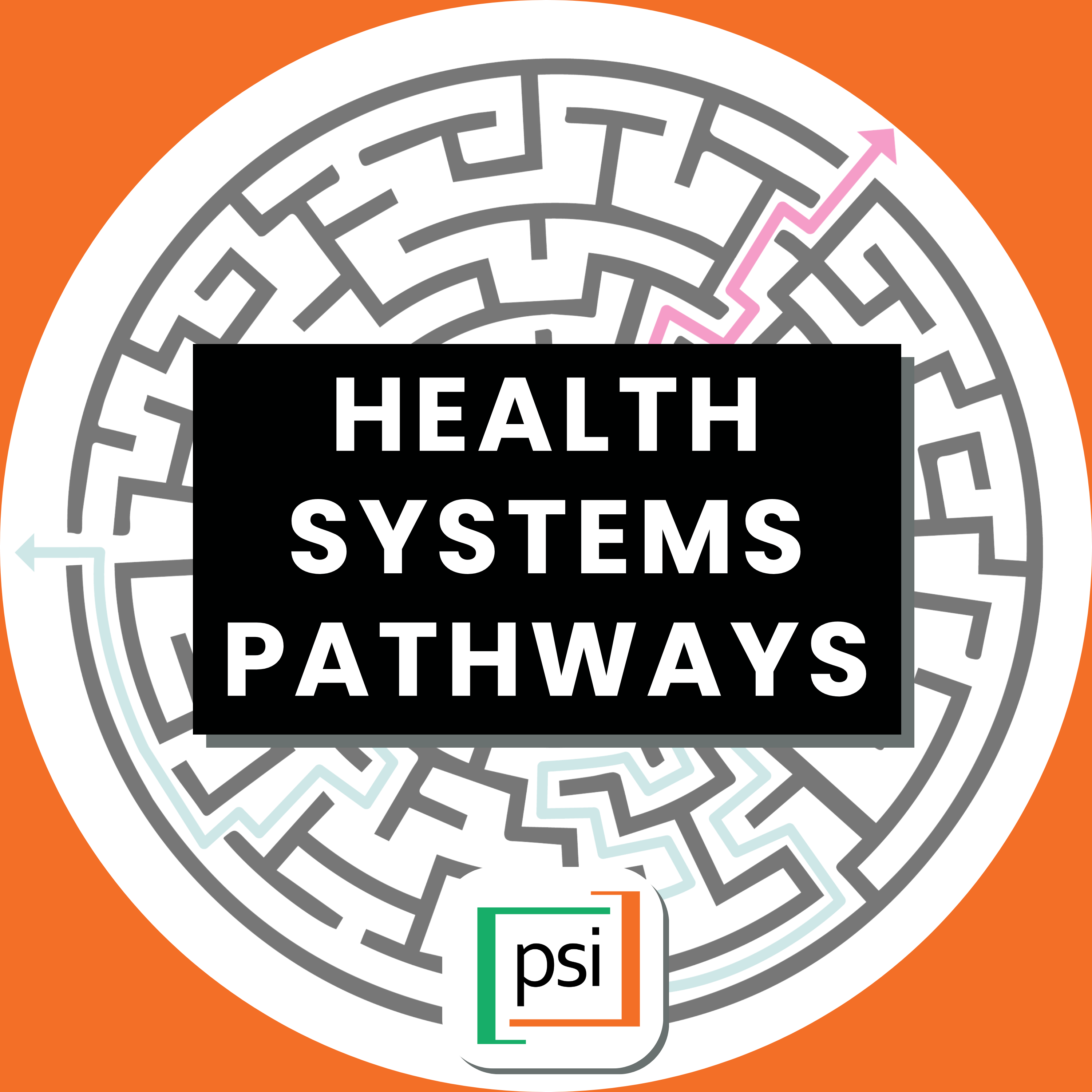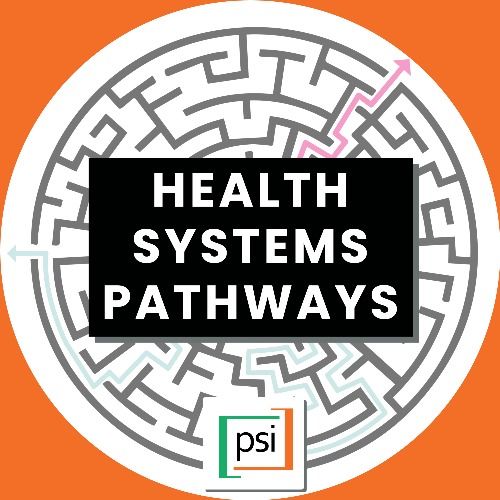Episode 7
Optimising Resources for Better Health Outcomes
Optimising primary health care systems is essential for improving health outcomes and achieving resilience. Recorded live at HSR2024 in Nagasaki, this episode dives into the critical role of health system design, data integration, and performance management in rethinking how resources are allocated and services delivered.
Nirmala Ravishankar, Deputy Director of the Primary Health Care team at the Gates Foundation, discusses how smarter planning and better data use can transform health systems. She highlights examples from Pakistan and explores strategies for creating feedback loops to address gaps in service delivery and improve accountability.
This conversation is packed with actionable insights for policymakers, health professionals, and organizations looking to strengthen primary health care systems globally.
For more information;
HSS Insights Series: PSI - To access Population Service International's blogs and policy briefs, visit our health systems insights website.
Health Systems Pathways is an SCL Agency Production.
Transcript
Hi everyone, welcome back to Health Systems Pathways.
Alex Ergo:I'm Alex Ergo, PSI's Director of Health Systems, and I'm excited to bring you the third live episode recorded at the Health Systems Research Symposium in Nagasaki.
Alex Ergo:In today's episode, we focus on primary health care and the critical role of health system design.
Alex Ergo:We'll be hearing about how better resource allocation and smarter data use can optimize service delivery, and how we can get better at performance tracking to drive improvements in health outcomes.
Alex Ergo:It's an inspiring conversation packed with practical insights.
Alex Ergo:So, let's dive in.
Alex Ergo:Hi, everyone.
Alex Ergo:We're back here and with me is Nirmala Ravishankar.
Alex Ergo:Nice to have you with us.
Alex Ergo:Nirmala, would you like to start by briefly introducing yourself?
Nirmala Ravishankar:Sure.
Nirmala Ravishankar:Thanks, Alex.
Nirmala Ravishankar:My name is Nirmala and I'm deputy director of the primary health care team at the Gates Foundation.
Nirmala Ravishankar:And yeah, I'm excited to meet with you today.
Alex Ergo:Great.
Alex Ergo:So, let me start by asking you, what are some of the priorities that you're focusing on with your new role?
Nirmala Ravishankar:Yeah.
Nirmala Ravishankar:We have a primary health care strategy and it's got a few different moving parts, but the part that I've been thinking a lot about and that perhaps we could start with is a question around health system design, or that's the term we've been using to think about it, which is to say, especially for public sector delivery, but certainly for for delivery of primary health care across sectors, how and where in government, are people thinking about whether the existing facilities are in the right places?
Nirmala Ravishankar:Whether our health workers are deployed in the most optimal manner?
Nirmala Ravishankar:And are there ways to improve that allocation or reallocate?
Nirmala Ravishankar:Such that you're optimizing for output and indeed outcomes?
Nirmala Ravishankar:And what kind of data you use to make those kinds of decisions, right?
Nirmala Ravishankar:Because it's not an abstract question, but rather being able to say, 'Hey, here's where the people are and here's where the needs are'.
Nirmala Ravishankar:And compared to the needs, we don't have sufficient number of facilities and we have the right facilities, but we don't have the right people where those facilities are.
Nirmala Ravishankar:So it's an optimization problem for which you need data, you need as well operational data to see what's the readiness of the existing facilities, you need output data.
Nirmala Ravishankar:So it's a planning question first and foremost, but that quickly leads you into thinking about what kind of data is the health system currently producing, and is it sufficient to answer these kinds of questions?
Nirmala Ravishankar:And there, I think we're feeling our senses that most countries, low and middle-income countries, actually have a lot of existing data systems, but they're not often connected in a way that you can look at all sides of the equation, by which I mean you can start with how much money is going into the system to buy what kind of inputs; the workers, the commodities, et cetera, and then leading to what kinds of, or what amount of outputs.
Nirmala Ravishankar:Because if you could line up those three pieces, then you could really explore, if you think of a bunch of facilities or a bunch of districts, why are some facilities or some districts doing better than others, and you can start making those comparisons if you could link the data.
Nirmala Ravishankar:But right now, in many places where we're working, you have public financial management systems that track the money, especially public money.
Nirmala Ravishankar:You have the district health management information systems that track output; how many services did we deliver today or in the past month?
Nirmala Ravishankar:And then you have other health information systems that are for health workers and a separate system for supply chain and another system that will be just for some vertical disease program, and that interoperability between those systems remains quite weak.
Nirmala Ravishankar:So, just to then go back to your question, we're both thinking about how to strengthen capacities and the muscle within the system to ask these questions about whether existing resources, and by resources, money, but also people, are being allocated in a way to optimize output and linking or informing those kinds of decisions with good, robust, timely and high quality data about flow of funds, about by
Nirmala Ravishankar:operations,
Nirmala Ravishankar:about facility operations , are there drugs on the shelves?
Nirmala Ravishankar:Are the health-workers showing up to work?
Nirmala Ravishankar:And then output.
Nirmala Ravishankar:So that's in a nutshell, maybe a large nutshell, what we're thinking about and working on.
Alex Ergo:That's excellent.
Alex Ergo:Yes, I can see that very often.
Alex Ergo:It's still very much top down and based on norms rather than on the reality on the ground.
Alex Ergo:And so, what you just described is, I would imagine, the first step once you have your resources allocated to the right place, that's a good start.
Alex Ergo:But then how do you.
Alex Ergo:Track performance and make sure that what's being done in those delivery points meets the needs of the patient or the client.
Nirmala Ravishankar:Absolutely.
Nirmala Ravishankar:So, you've hit the nail on the head in terms of the need for tracking performance and holding different system actors accountable.
Nirmala Ravishankar:And so, it's a loop, right?
Nirmala Ravishankar:It's a virtuous cycle between starting with good planning, which needs to be informed by robust data, and then on the flip side, you're holding people accountable for performance against a certain plan that's articulating what the vision is.
Nirmala Ravishankar:So, they go hand in glove, these two pieces, the realistic planning, as well as the performance management.
Alex Ergo:Yeah, excellent.
Alex Ergo:And do you see already good examples where, countries are thinking that way and actually putting it into practice?
Nirmala Ravishankar:Yeah.
Nirmala Ravishankar:So in Pakistan one of my colleagues is working closely with a couple of provincial governments there as well as implementing partners, our partners to think about a low cost and quick, in real time, an approach for tracking service readiness and tracking outputs and then feeding that.
Nirmala Ravishankar:into planning.
Nirmala Ravishankar:Because if you just think about it, if you're doing the performance tracking and you say, wait a minute, this facility is continuously lagging, then you can start exploring why that is.
Nirmala Ravishankar:And maybe some of those issues are within the control of the facility.
Nirmala Ravishankar:But perhaps there are other issues that go that are more systemic.
Nirmala Ravishankar:And then you need to build that into your plans as a local district or as the provincial government or state government in a country.
Nirmala Ravishankar:So, we've seen that kind of feedback loop coming into play, even though our entry point into that work was more from the performance management end of things, because that's where government was most keen to start.
Nirmala Ravishankar:But you can start seeing how it's influencing the planning processes at different levels of government.
Alex Ergo:Are you referring to these rapid cycles through the faster approach, or is that different?
Nirmala Ravishankar:That's different.
Nirmala Ravishankar:That's also something we're working on.
Nirmala Ravishankar:But you can see how that's that's also an attempt to very quickly understand the performance at facility level.
Nirmala Ravishankar:Ultimately, when you think about what information you may want to track in a system, A.P.H.C.
Nirmala Ravishankar:service delivery system.
Nirmala Ravishankar:You need the administrative data, the data that the facilities are tracking every day and reporting into the system.
Nirmala Ravishankar:But you also need some way to independently check the veracity of that.
Nirmala Ravishankar:Right now, we do surveys, but if you do a large survey of all facilities, that's a costly and time consuming enterprise, which you're not going to be able to do every month or even every year.
Nirmala Ravishankar:And so, what are some ways to rapidly check for service readiness?
Nirmala Ravishankar:It's something that we've been thinking about and making investments around.
Nirmala Ravishankar:And then you can think of a few additional pieces, right?
Nirmala Ravishankar:One is just the facility level readiness and tracking that both through administrative data and independent monitoring.
Nirmala Ravishankar:But you also want to understand the patient experience and people could go to the facility and get the services, but if they're not treated with respect, if the waiting times are really long...
Nirmala Ravishankar:so you need to also track the patient experience.
Nirmala Ravishankar:And then the final piece is what is not covered by all of this, are the people who are not going to get care.
Nirmala Ravishankar:You wouldn't be capturing them from either of those other two, other two exercises.
Nirmala Ravishankar:So you also need population level surveys to understand why some people are still not going to seek care when they need it.
Nirmala Ravishankar:What are the barriers?
Nirmala Ravishankar:Is it financial?
Nirmala Ravishankar:Is it physical access?
Nirmala Ravishankar:Is it knowledge?
Nirmala Ravishankar:Is it something else?
Nirmala Ravishankar:So, these are all the different components that you need to really truly be able to understand the current performance of the system as well as to design for a better service delivery system.
Nirmala Ravishankar:Obviously, you're not going to get there overnight.
Nirmala Ravishankar:You're not going to build out all these capacities overnight, but starting somewhere and looking for those virtuous cycles if it's from performance management to realistic planning, great, but in some other country, maybe the opportunity is first to start with a big service delivery reform that state government or national government is enthusiastic about.
Nirmala Ravishankar:And so whatever that opportunity may be, that opening might be to start there and then build towards this comprehensive information system to inform realistic planning and performance management for primary health-care.
Alex Ergo:This is super exciting.
Alex Ergo:And yes, this is not going to happen overnight.
Alex Ergo:But at least you have some sort of North Star that you can follow.
Alex Ergo:And do you see these pieces already in the making?
Alex Ergo:For example, you gave the example of Pakistan.
Alex Ergo:Do you see all these different pieces already being worked on separately and with the idea that they will come together?
Alex Ergo:Or is that the next step?
Nirmala Ravishankar:I would say that, in some places, these pieces are starting to come together really well.
Nirmala Ravishankar:But I think this kind of more comprehensive approach is something that our team has been working on for a few years, but we're getting clearer about what we mean and clearer about what kind of investments we need to make to catalyze this kind of change.
Nirmala Ravishankar:I think we're also looking at many of these changes.
Nirmala Ravishankar:We're starting with some subnational governments, right?
Nirmala Ravishankar:So, primary health care delivery is by and large in many big countries controlled by local governments.
Nirmala Ravishankar:And so if you enter a country with 50 local governments, you're not working with all of them.
Nirmala Ravishankar:So starting with one or two where the opportunities present themselves and almost arriving at a proof of concept and then taking learnings from that work to advocate for and push for change in that country first and foremost because especially you know learning between states within a country is easier than learning between countries because you've already controlled for many things, political system, culture, by and large.
Nirmala Ravishankar:And creating those opportunities for diffusion and learning within countries from subnational work in one or two targeted places and then, of course, scaling it even broader than that to create opportunities for regional and global knowledge sharing is also something that we invest in heavily.
Alex Ergo:This is a great agenda.
Alex Ergo:I know really something exciting to focus on.
Alex Ergo:So, thank you for sharing that.
Alex Ergo:Maybe before we end, a last question about the conference.
Alex Ergo:This is our third day into the conference.
Alex Ergo:What are some of the takeaways?
Alex Ergo:What surprised you?
Alex Ergo:Or what are some of your observations?
Nirmala Ravishankar:I think closer to home for me, you know, I was one of the organizers of a session on Monday, that was all about big health systems reforms and what motivates countries to undertake health systems reforms.
Nirmala Ravishankar:And the big message there was to start with a clear articulation of the problem.
Nirmala Ravishankar:And it sounds so simple, it sounds intuitive and obvious, but there are numerous examples of countries starting with a solution rather than the problem and to be perfectly blunt, sometimes conferences like this can lead to there's this term Lant Pritchett, I think, coined about isomorphic mimicry, right?
Nirmala Ravishankar:You go to a conference, you hear about, oh, this country has done X and that sounds really great.
Nirmala Ravishankar:And so, we should also come and do X, but does X actually respond to the problem in your country?
Nirmala Ravishankar:So, starting with a very clear articulation of the problem you're trying to solve for and the objective that you're trying to achieve and then back into the right solution.
Nirmala Ravishankar:So that was that was a message from our session, but big picture, this conference is shining a bright bright light on the need to think about climate change, and you know what we in the health sector folks working on health systems can do about climate change as well as how the health system can be made to be more resilient to climate change.
Nirmala Ravishankar:And I think that's a really timely and important conversation.
Nirmala Ravishankar:It is not one that leads to easy answers but one that we need to really grapple with.
Alex Ergo:Yeah, and I would say that all the things that you've discussed in the beginning are actually contributing to make the health system more resilient because you can become more agile and responsive to where the needs are, so in some way it comes together.
Nirmala Ravishankar:Absolutely.
Alex Ergo:Thank you to Nirmala for sharing her insights on how better planning, performance management and data use can transform primary health care.
Alex Ergo:Today's episode highlighted the importance of rethinking health system design, whether it's optimizing resource allocation, strengthening data systems or creating feedback loops to improve performance.
Alex Ergo:Thank you for tuning into Health Systems Pathways.
Alex Ergo:If you enjoyed this episode, don't forget to subscribe or follow us wherever you get your podcasts.
Alex Ergo:We'll bring you more fresh insights from the halls of the HSR Symposium in Nagasaki very soon.
Alex Ergo:Until next time, I'm Alex Ergo.
Alex Ergo:Let's keep working together to build stronger health systems that work for people.




